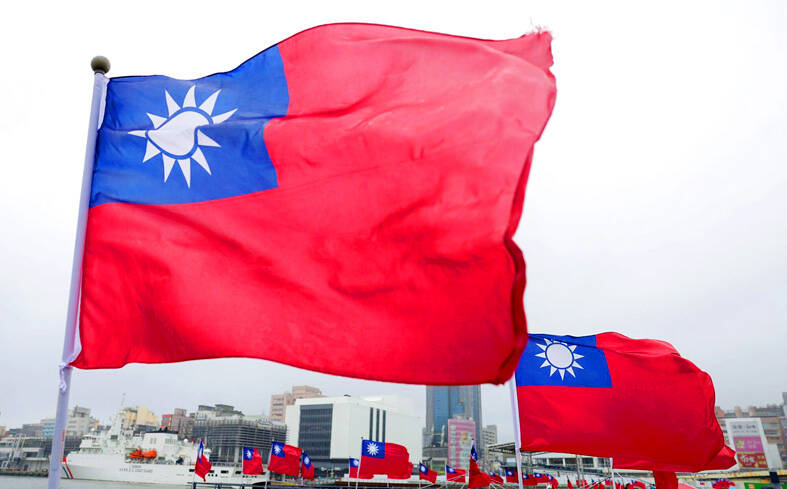A “new wave of disinformation” is heading across the Strait before the presidential election in January as Taiwan tries to combat China’s ever-shifting and increasingly subtle disinformation tactics, the New York Times reported.
Boasting “a resilience to foreign meddling that could serve as a model to the dozens of other democracies holding votes in 2024,” Taiwan “is ready for the disinformation onslaught” from China, the report said.
Taiwan has “one of the world’s most mature” communities of fact-checkers, government investments, international media literacy partnerships and a public sense of skepticism, it said.

Photo: I-Hwa Cheng, Bloomberg
“The challenge now is sustaining the effort,” it quoted Minister of Digital Affairs Audrey Tang (唐鳳) as saying.
Tang added that Taiwan now needs to “stay agile.”
Beijing’s efforts, such as criticizing Taiwan’s handling of the COVID-19 pandemic and launching cyberattacks when then-US House of Representatives speaker Nancy Pelosi visited Taiwan last year, “has struggled to sway public opinion,” it said.
Operations including the Taiwan FactCheck Center, Fake News Cleaner, Cofacts, Doublethink Lab and MyGoPen are providing fact-checking to help citizens ward off Beijing’s disinformation campaign, it said.
Many Taiwanese have developed internal “warning bells” for suspicious narratives, Fake News Cleaner cofounder Melody Hsieh (謝呈釀) said.
However, some fact-checkers and watchdog groups warned against “public apathy” towards fact-checking, the resources of which were not widely used in past elections, it said.
In addition, posts originating from China “appear increasingly subtle and organic, rather than flooding the zone with obvious pro-Beijing messages.”
Content farms under Beijing’s control might create false information, which would then be spread by agents, bots or unwitting social media users, it said.
Other tactics used by Beijing include buying established Taiwanese social media accounts and paying Taiwanese influencers to promote pro-China narratives, the report cited research from the RAND Corp as saying.
The Chinese disinformation campaign also shifted its focus from the relations between the two sides of the Taiwan Strait to Taiwan’s domestic issues to provoke social division, such as “spreading lies about local services and health issues,” it said.
In comparison to the last presidential election in 2020, Beijing is “no longer distracted by pro-democracy demonstrations in Hong Kong” and can take better advantage of artificial intelligence, such as creating deep fake videos or images, it said.
President Tsai Ing-wen (蔡英文) previously said that cracking down on disinformation is one of the “most difficult challenges for democracies” and requires “a whole-of-society effort.”

Taiwan has received more than US$70 million in royalties as of the end of last year from developing the F-16V jet as countries worldwide purchase or upgrade to this popular model, government and military officials said on Saturday. Taiwan funded the development of the F-16V jet and ended up the sole investor as other countries withdrew from the program. Now the F-16V is increasingly popular and countries must pay Taiwan a percentage in royalties when they purchase new F-16V aircraft or upgrade older F-16 models. The next five years are expected to be the peak for these royalties, with Taiwan potentially earning

STAY IN YOUR LANE: As the US and Israel attack Iran, the ministry has warned China not to overstep by including Taiwanese citizens in its evacuation orders The Ministry of Foreign Affairs (MOFA) yesterday rebuked a statement by China’s embassy in Israel that it would evacuate Taiwanese holders of Chinese travel documents from Israel amid the latter’s escalating conflict with Iran. Tensions have risen across the Middle East in the wake of US and Israeli airstrikes on Iran beginning Saturday. China subsequently issued an evacuation notice for its citizens. In a news release, the Chinese embassy in Israel said holders of “Taiwan compatriot permits (台胞證)” issued to Taiwanese nationals by Chinese authorities for travel to China — could register for evacuation to Egypt. In Taipei, the ministry yesterday said Taiwan

‘LIKE-MINDED PARTNER’: Tako van Popta said it would be inappropriate to delay signing the deal with Taiwan because of China, adding he would promote the issue Canadian senators have stressed Taiwan’s importance for international trade and expressed enthusiasm for ensuring the Taiwan-Canada trade cooperation framework agreement is implemented this year. Representative to Canada Harry Tseng (曾厚仁) in an interview with the Central News Agency (CNA) said he was increasingly uneasy about Ottawa’s delays in signing the agreement, especially as Ottawa has warmed toward Beijing. There are “no negotiations left. Not only [is it] initialed, we have three versions of the text ready: English, French and Mandarin,” Tseng said. “That tells you how close we are to the final signature.” Tseng said that he hoped Canadian Prime Minister Mark Carney

Taiwan is awaiting official notification from the US regarding the status of the Agreement on Reciprocal Trade (ART) after the US Supreme Court ruled US President Donald Trump's global tariffs unconstitutional. Speaking to reporters before a legislative hearing today, Premier Cho Jung-tai (卓榮泰) said that Taiwan's negotiation team remains focused on ensuring that the bilateral trade deal remains intact despite the legal challenge to Trump's tariff policy. "The US has pledged to notify its trade partners once the subsequent administrative and legal processes are finalized, and that certainly includes Taiwan," Cho said when asked about opposition parties’ doubts that the ART was